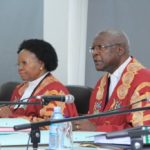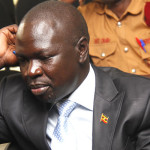President Yoweri Museveni can now contest in the 2021 presidential elections after The Supreme Court on Thursday evening in the unanimous decision of 4-3 dismissed the appeal on the removal of the upper age limit of 75 years for anyone to participate in the presidential elections.
Justices Barti Katurebe, Stella Arach Amoko, Justice Rubby Opio Aweri and Jotham Tumwesigye upheld the ruling of the Constitutional Court which in July 2018 dismissed the consolidated petition that was seeking for the reinstating the 75 year cap beyond which no one can run to become president of Uganda.
On the other hand, Justices Justice Paul Mugamba, Lillian Tibatemwa Ekirikubinza and Eldad Mwanguhya dismissed the ruling of the constitutional court on the matter.
Justice Mugamba said: “The Constitutional Amendment Act 2018 is hereby struck down for having been passed in violation of the Constitution and the rules of procedure of Parliament.”
He ruled that the absence valid certificate of compliance showed that there was nothing (bill) valid to ascend to by the President.
He said there was evidence on record that some MPs opposed to age Limit amendment were unlawfully blocked. This was most unfortunate.
“The Speaker did not have justification of prioritizing the Magyezi motion which was hastily introduced onto the order paper,” he said.
Justice Lillian Tibatemwa Ekirikubinza said: “I find that under no circumstances should a Speaker forward a bill to the President with full knowledge that it contains provisions passed in contravention of the Constitution.”
She added that the Amendment Act fails and was enacted without strict compliance with Parliamentary rules. She says the principle of severance does not apply in the instant case because the entire process was so flawed that the entire Act is unconstitutional.
Sher ruled that the Speaker has no power to unilaterally determine the contents of the order paper.
Justice Mwanguhya said: “Interference of the UPDF (SFC) in parliamentary proceeding was unconstitutional. The unconstitutionality of the acts deviates the process.”
She blamed the Inspector General of Police who, through a memo from AIGP Asuman Mugenyi, restricted consultations by MPs. She says the presence of UPDF soldiers in actively removing MPs from the Chambers violated the sovereignty of Parliament.
Justices who upheld age limit removal
“On the issue of amending article 102(b), I am in agreement with my learned friends that amending article 102(b) does not destroy the basic features of the constitution since the people still have the power to choose who they want to rule them,” said Justice Stella Arach-Amoko.
While concluding her ruling she said: “I will, therefore, dismiss the consolidated appeal and the parties shall bear their cost.”
Article 102 (b) of the Constitution does not form the basic structure doctrine. The article is, not among the entrenched provisions of the Constitution, she said.
Justice Arach-Amoko also dismissed petitioner Male Mabirizi Kiwanuka’s preliminary objections regarding claims he was unfairly treated by being asked not to sit at the bar with practicing counsel.
She further ruled said: It is a notorious fact that Mr Mabirizi is not a practicing advocate and has not been called to the bar, therefore he couldn’t have sat with advocates.”
She also ruled that Parliament acted within its powers by amending article 102(b) saying it does not violate the basic structure doctrine and is within the mandate conferred upon it by the Constitution & as representatives of the people.
However, she agreed with the consolidated petition which said that the extension of the term of the current Parliament and Local Councils is null and void from the onset, saying a Private Member’s Bill cannot introduce charges on the Consolidated Fund, by way of the referendum it imposes.
She said that it violated article 93 of the Constitution which restricts Private Member’s Bill on introducing Bills or amendment Bills that will impose charges on the Consolidated Fund otherwise than by reduction.
She also said Speaker Rebecca Kadaga had authority to amend the order paper to allow MP Raphael Magyezi’s private members bill that thought the removal of the presidential age limit. She said the speaker is in charge of the House and its order of business
Justice Arach-Amoko could also not agree with petitioners, saying the MPs ejected from the House during debate on upper age limit removal were so ejected on the basis of their own lack of decorum. She added that whereas the security services were justified in removing the MPs from Parliament, the force used was not justified.
Justice Jotham Tumwesigye dismissed most of the allegations by petitioners and in his ruling said judges in the Constitutional Court did not err in their ruling.
In the second session that resumed at 2pm, Justice Rubby Opio Aweri dismissed the appeal on removal age limit
He disagreed with the petitioners on Shs 29 million for consultation to MPs, saying it was appropriated by parliament. The petitioners claimed it was sort of a bribe and unconstitutional.
Justice Aweri also ruled like Justice Arach that Article 102 did not fall under the basic structure of our constitution so it could be amended by parliament.
He said opposition MPs behaved inappropriately during the age limit removal debate leading to violence. “I rule that those MPs who were assaulted like Hon. Nambooze should sue government…,” he said.
He dismissed the appeal while agreeing with the Attorney General on all grounds and says the Constitutional Court rightly applied the principle of severance.
In December 2017, lawyer Male Mabirizi petitioned the Constitutional Court challenging the process through which Parliament passed the controversial Bill on the amendment the Constitution to remove the presidential age limit.
That came after in December 2017 voted by majority of 317 MPs against 97 to change the Constitution and remove the 75-year age limit on the presidency and to extend the term of president and Parliament from five to seven years.
The Constitutional Amendment Bill of 2017 was assented to by Museveni to become law, which allows him to stand for another term and more.
Mabirizi filed the suit against the Attorney General (AG), who is cited as the respondent in the case.
Mabirizi, who filed the suit in his own capacity as a concerned citizen, contended that the actions of Parliament to consider and grant leave to Mr Raphael Magyezi (Igara West MP) to table a Private Member’s Bill when the Leader of Opposition in Parliament, Opposition Chief Whip and other opposition MPs were not in Parliament was in contravention of the Constitution.








